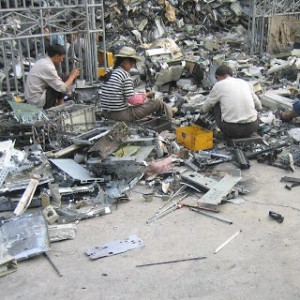6-Mar-2007
United Nations University
Growing need for elements in high-tech scrap –- often incinerated in poor countries
 Standardizing recycling processes globally to harvest valuable components in electrical and electronic scrap (E-scrap), extending the life of products and markets for their reuse, and harmonizing world legislative and policy approaches to e-scrap are prime goals of a new global public-private initiative called Solving the E-Waste Problem (StEP).
Standardizing recycling processes globally to harvest valuable components in electrical and electronic scrap (E-scrap), extending the life of products and markets for their reuse, and harmonizing world legislative and policy approaches to e-scrap are prime goals of a new global public-private initiative called Solving the E-Waste Problem (StEP).
Major high-tech manufacturers, including Hewlett-Packard, Microsoft, Dell, Ericsson, Philips and Cisco Systems, join UN, governmental, NGO and academic institutions, along with recycling / refurbishing companies as charter members of the initiative, officially launched March 7.
Valuable resources in every scrapped product with a battery or plug — computers, TVs, radios, wired and wireless phones, MP3 players, navigation-systems, microwave ovens, coffee makers, toasters, hair-dryers, to name but a few — are being trashed in rising volumes worldwide.
Worse, items charitably sent to developing countries for re-use often ultimately remain unused for a host of reasons, or are shipped by unscrupulous recyclers for illegal disposal. And, too often, e-scrap in developing countries is incinerated, not only wasting needed resources but adding toxic chemicals to the environment, both local and global.
“There’s more than gold in those mountains of high-tech scrap,” says Ruediger Kuehr of the United Nations University, which will host the StEP Secretariat in Bonn. “This partnership is committed to salvaging these increasingly precious resources and preventing them from fouling the environment.”
Full text: http://www.eurekalert.org/pub_releases/2007-03/unu-uio022707.php
Media coverage summary: http://spreadsheets.google.com/ccc?key=pRwdzmg01IrTWcGq9WF-HSw
Example coverage, by the Indo Asian News Service, click here